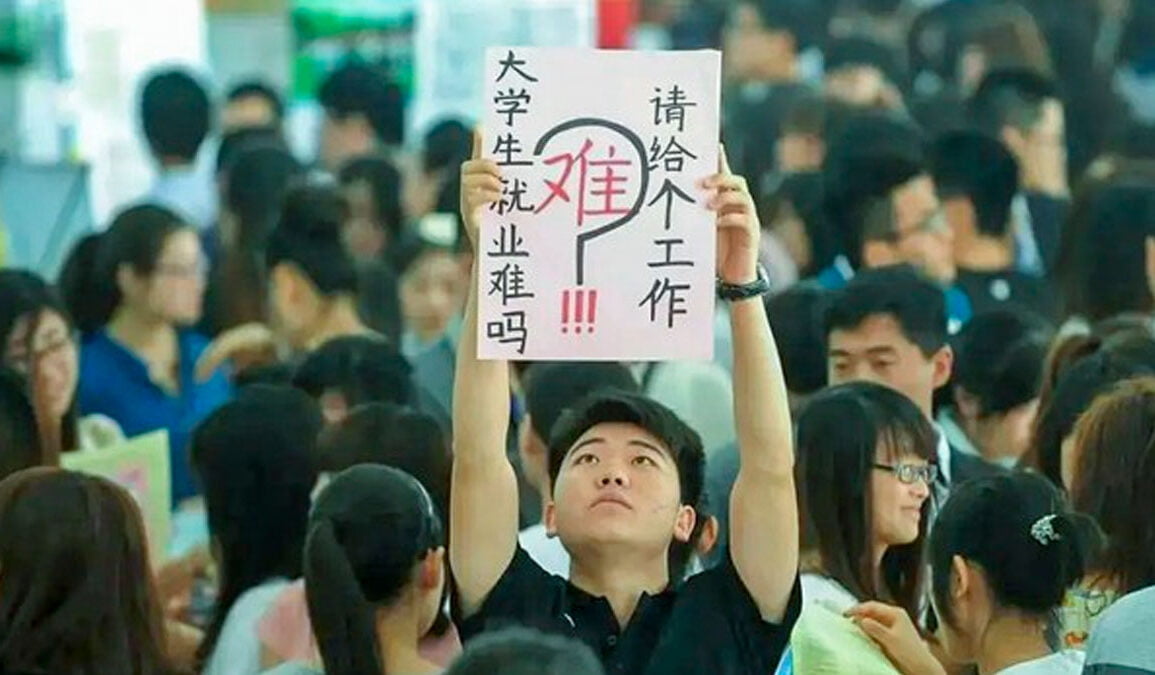In recent years, China’s economic landscape has undergone a significant transformation, moving away from the rapid growth that once characterized the world’s second-largest economy. This slowdown has led to the rise of a generation of young people who feel increasingly alienated from the workforce. Referred to as “rotten-tail kids,” these young adults represent a growing group of educated Chinese youth who struggle to find stable employment and feel discouraged by a job market that offers limited prospects for their future.
From Booming Economy to Economic Crisis
For decades, China’s rapid economic growth fueled dreams of prosperity and upward mobility, especially for those who pursued higher education. However, in recent years, various factors have contributed to a marked slowdown in the country’s economic growth. Signs of economic cooling were evident even before the COVID-19 pandemic, but the pandemic’s restrictions and lockdowns significantly impacted economic activities, shaking the confidence of both consumers and businesses.
“Money just disappeared in a way that I didn’t see coming,” said Chloe Fu, a 26-year-old employed at an online legal services firm in Changsha. Her concern mirrors the fears of many young Chinese who are increasingly anxious about their financial security in an economy that appears to be stagnating. Despite Chinese officials setting a 5% growth target for 2024, many analysts believe the actual growth rate may fall short of this goal. Some prominent scholars even argue that China’s economy might not be experiencing growth at all.
Challenges Facing the Educated Youth
While the older generation approaching retirement enjoys relative stability, with adequate pensions and homeownership, the younger generation faces a much bleaker reality. The once-aspirational goals of homeownership and stable careers seem increasingly unattainable for today’s youth.
“The inability to afford a house and a car with a middle-class income isn’t unique to China,” a report on the country’s economic conditions pointed out. “But in China, the pain is sharper due to the dramatic decline from previous economic heights, particularly for educated youth.” This is reflected in the experience of Liu Wenning, a middle manager at a Beijing-based internet company. “If you’d asked me a few years ago, I’d be planning to buy my girlfriend a nice piece of jewelry for [Chinese] Valentine’s Day,” Liu said. “Instead, we settled for a movie and dinner. It still felt like splurging.”
The economic strain is not only affecting everyday living but is also reshaping career trajectories. A college degree, once seen as a pathway to a secure and well-paying job, no longer guarantees such stability. By June 2023, the youth unemployment rate reached a worrying 21.3%, prompting Chinese authorities to temporarily stop publishing youth unemployment data. Even after adjusting their calculations, the situation remained dire, with the jobless rate for those aged 16-24 rising to 17.1% in July 2024.
Desperation and the “Rotten-Tail Kids” Phenomenon
The term “rotten-tail kids” has gained popularity on Chinese social media, drawing comparisons to “rotten-tail buildings”—abandoned construction projects that symbolize broader economic issues. These young adults, often graduates from prestigious universities, find themselves in low-paying jobs far below their qualifications, relying on their parents’ pensions, or opting out of the job market entirely. Some have become “full-time children,” living off their parents as they see no viable career options.
This job market desperation has also made young people more susceptible to scams. A particularly distressing incident involved a 19-year-old intellectually disabled man who was deceived into undergoing breast augmentation surgery by scammers who promised him a job at a cosmetic surgery clinic. Desperate for work, the young man took out a 30,000 yuan ($4,180) loan to cover the surgery costs. His plight sparked widespread outrage on social media, highlighting how financial desperation is being exploited.
Structural Challenges with No Quick Fixes
The emergence of “rotten-tail kids” is not merely a consequence of a weak economy but points to deeper structural problems within China. The rapid expansion of university enrollment in the late 1990s, intended to create a more educated workforce, has led to an oversupply of graduates. With more young people entering the job market, the gap between qualified candidates and high-paying job opportunities has widened. According to a study by China Higher Education Research, this imbalance could persist until at least 2037.
Even students in high-demand fields such as artificial intelligence find the job market increasingly competitive. Shou Chen, a third-year AI student at Beijing University of Posts and Telecommunications, has struggled to secure an internship despite numerous applications. “It might get worse,” she said, referring to future job market prospects. “After all, more and more people are entering this field.”
Government Efforts and an Uncertain Future
In response to the escalating unemployment crisis, President Xi Jinping has emphasized the need to create jobs for young people. The government has launched various initiatives, including job fairs and supportive policies for businesses, to boost hiring. However, these efforts have yet to produce significant results. Economic challenges persist, exacerbated by issues like the ongoing property crisis and low consumer confidence.
Yun Zhou, an assistant professor of sociology at the University of Michigan, observed, “For many Chinese college graduates, better job prospects, upward social mobility, and a brighter life outlook—once promised by a college degree—have become increasingly elusive.” This growing disillusionment is fostering a sense of despair among young people who once had high hopes for their future.
The future outlook for China’s youth remains uncertain. High levels of unemployment and underemployment are not just economic problems but are also undermining the social contract that promised prosperity in return for hard work and education. Without significant changes to address these deep-rooted issues, the “rotten-tail kids” phenomenon is likely to persist, leaving a generation questioning the value of their education and their place in society.
As China navigates its economic challenges, finding sustainable solutions to support its youth will be essential for the country’s long-term stability and growth. For now, however, many young Chinese face an uncertain future, wondering if their dreams of a better life will ever be realized.
ACZ Editor Notes: The U.S. has its share of “rotten-tail kids” as well, but perhaps the difference lies in the structure of our economy, which allows diligent individuals to find their place and succeed. The socialist nature of the Chinese economy does not provide as much room for personal initiative and entrepreneurship, leaving those who are marginalized unable to resolve their issues by simply working harder.
The article notes that older generations will enjoy comfortable pensions, but this is only on paper. If the younger generations are not productive enough to support them, their pensions will lose value, and inflation could render them impoverished.








